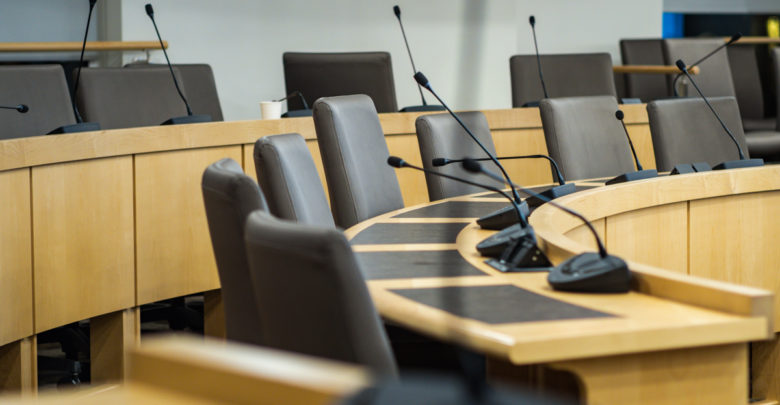Notes from Council: 2023-24 executive goals presented
"Students are not just the recipients of education. They are active participants in shaping their own educational journey," UASU President says.
 Helen Zhang
Helen Zhang“Notes from Council” is The Gateway’s ongoing series of recaps of noteworthy items from Students’ Council meetings.
At Students’ Council on August 1, the executive team presented the 2023-24 executive goals.
The executive goals are a formal plan of what each executive wants to accomplish during their term, based on their platforms and issues that have come up during the year. Additionally, the goals are based on the University of Alberta Students’ Union’s (UASU) long-term goals as outlined in the UASU strategic plan, and the Aboriginal Relations and Reconciliation Committee’s (ARRC) recommendations.
The goals are split into three major themes: “Amplify Student Voices,” “Enhance and Cultivate the Student Experience,” and “Promote Comprehensive Student Learning.”
“We recognize that students are at the heart of what we do as an organization. Students are not just the recipients of education. They are active participants in shaping their own educational journey,” UASU President Christian Fotang said.
“Amplify Student Voices:” UASU strategic plan, representation and inclusivity in elections, and student issues
Under “Amplify Student Voices,” goals include developing the new UASU strategic plan, and cultivating an “inclusive, safe, and supportive council culture through the review and improvement of governance structures and processes,” Fotang said. The executives also want to “encourage diverse representation and inclusivity within candidates for upcoming and future [UASU] elections.”
Additionally, they want to ensure “that Indigenous student leaders have the necessary support and resources they need to succeed,” Fotang said. This will involve working closely with Indigenous students and student groups, he added.
Other goals include renewing the UASU website, reviewing the student group grant application process, increasing direct engagement with students, and improving access to volunteer opportunities on and off-campus.
Part of the theme’s goals focus on advocacy for student issues such as sexual and gender-based violence on campus and inequity issues international students face. Vice-president (external) Chris Beasley said that the UASU needs to grow the public profile of students, because students “don’t just exist in the microcosm of what university looks like.”
“Enhance and Cultivate the Student Experience:” financial supports, campus accessibility, and supportive community
As part of the second theme, “Enhance and Cultivate the Student Experience,” the executives want to focus on financial issues students face.
“It should come as no surprise that our post-secondary education is not cheap. And it’s not getting any cheaper,” Vice-president (operations and finance) Levi Flaman said.
Goals include reducing the UASU’s operational expenses, reducing reliance on student revenue, and increasing student discount opportunities. Additionally, the executives want to increase awareness of the U of A’s needs-based financial aid supports and advocate for greater eligibility.
For campus accessibility, the executives want to start the process of building an accessible gender neutral washroom in Dewey’s and improve accessibility for academic accommodations. They also want to develop a framework for the period equity initiative that is “sustainable and scalable,” Flaman said.
In order to build a supportive university community, the executive team plans to ensure “that the university continues to incorporate cultural sensitivity training into counseling services here on campus. And, also that these services are accessible across our many campuses,” Vice-president (student life) Michael Griffiths said.
Additionally, the executives plan to advocate for an increased provincial mental health grant to the university that provides more funding to Augustana Campus and Campus Saint-Jean. They also want to push for the university’s Sexual Violence Response Coordinator position to become permanent.
“Promote Comprehensive Learning:” Indigenous learning, syllabus bank, hybrid learning
Under “Promote Comprehensive Learning,” the executives want to incorporate Indigenous learning through three goals. First, they plan to advocate for the implementation of Indigenous course content into new and existing courses. Griffiths said that the executives will work with Florence Glanfield, vice-provost (Indigenous programming and research) and the General Faculties Council (GFC) Programs Committee.
Secondly, the executives aim to improve the completion rate of the mandatory move-in module in residencies. The module is a “good opportunity for the university to educate students on what Indigenization and consent culture looks like on campus,” Griffiths said.
Thirdly, they want to organize a recognition event that promotes and highlights the achievements of Indigenous students.
In terms of academic issues and conditions, the executives want to improve standards and support for students in Work Integrated Learning and advocate to the provincial government for better internet infrastructure for remote, rural learners. They also want to continue advocacy for a syllabus bank.
“Our goal is ultimately for the university to provide a non-historic syllabus bank to students, so they can have the most up-to-date available information when selecting courses,” Vice-president (academic) Pedro Almeida said.
Additionally, the executive team wants to advocate for an increase in textbook affordability, the simplification of sub-degree accreditation recognition, and resource allocation toward hybrid learning.




